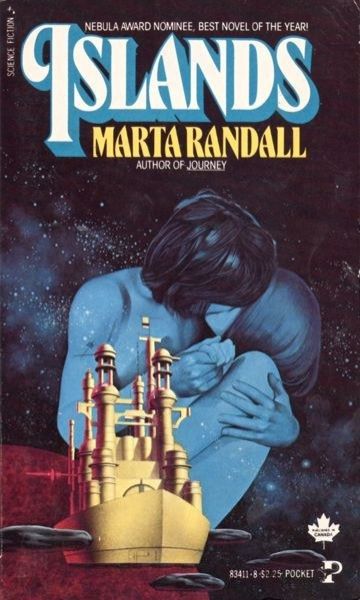Will You Still Need Me
Islands
By Marta Randall

25 Jul, 2020
Marta Randall’s 1976 Islands is a standalone science fiction novel.
Take the Immortality Treatment, live forever. That is the promise of the post-Great-Shaping world. The reality is very different for Tia Hamley. She is immune to the Treatment. Her contemporaries can look forward to eternity. Not Tia.
Why the Treatment does not work on her is unclear. Nevertheless, the evidence is incontestable. All medical science can offer her is involuntary sterilization (lest her debilitating condition be inherited by her children) and the best geriatric treatments available. Of course, as time goes by the conditions with which she wrestles are increasingly unique to Tia.
When she was young, Tia looked like everyone else. The older she gets, the older she looks. She is a living reminder of humanity’s defeated foe, old age, in an era when people are increasingly unaccustomed to confronting the unfamiliar or the disabled. Reactions vary but they have one commonality: she is always a curiosity.
Still, she cannot simply sit around for two centuries waiting for the Grim Reaper to visit. She has done her best to fill her life with meaningful work. Most recently, that means joining an expedition to fabled Hawai‘i. Who knows what lost secrets are hidden in the submarine ruins?
The Hawaiian islands were lost to the floods of the Great Shaping. Consequently, the expedition is marine, its base a boat. Crewed by colourful eccentrics, the boat’s close quarters provide ample opportunity for the members to determine precisely what it is they dislike about each other.
At least one crew member struggles to coexist with Tia. The solution? Simply help nature along a little and usher Tia into a slightly earlier grave.
~oOo~
But first! A complaint about hydrology. It would be very, very, very hard to sink the Big Island of Hawai‘i because it has been formed by impressive shield volcanoes. Mauna Kea’s peak is 4,207.3 meters above sea level. Mauna Loa is only slightly shorter. Provided the pair remained intact, there’s not enough water in frozen ice (the source of the floods) to come close to drowning the island. Still, as the history of Kīlauea shows, Hawai‘i’s volcanoes can significantly remodel the landscape. Perhaps the tsunami triggered by the Great Shaping triggered volcanic explosions and collapse.
Islands was nominated for the Nebula, along with Kate Wilhelm’s Where Late the Sweet Birds Sang, Robert Silverberg’s Shadrach in the Furnace, Niven and Pournelle’s Inferno, and Samuel R. Delany’s Triton. The book that won was … Pohl’s rather meh Man Plus. Huh. Curious are the ways of SFWA1.
Modern readers may conclude that the dreadful way in which the Immortals treat people who are disfigured or disabled, as a couple of characters are, is intended as a condemnation of Immortal society. Perhaps it is. Agelessness is not the same thing as invulnerability. The Immortals may not age but — as is graphically demonstrated — they die of other causes as easily as we do. Each Immortal will eventually die, just as soon as bad luck, bad judgment, or ennui puts a sufficiently lethal mishap in their path. Tia is a reminder of death’s inevitability, which some Immortals resent.
But I don’t think the rampant ableism is entirely meant as a criticism. That’s just how we treated disabled people back then. Ask Rosemary Kennedy.
Islands is a very Disco-era book, not least in the fact that it feels a need to explain why sea levels are higher. It depicts a future world that has enjoyed steady technological and social progress (something that we may be less likely to envision). It’s also a Disco-era book in that Randall feels free to indulge in philosophical speculation and slightly experimental prose. The 1970s were friendlier to literary ambitions than, say, the more commodified SF of the 1980s. Randall clearly took advantage of the zeitgeist to publish this thoughtful exploration of a mortal woman’s life.
Islands is available here (Amazon US), here (Amazon Canada), here (Amazon UK), here (Barnes & Noble), here (Book Depository), but it does not appear to be available from Chapters-Indigo.
1: Although the track record of the Nebulas is better than that of the John W. Campbell Memorial — not the other (former) John Campbell Award you may be thinking this is — Award, whose jury has twice famously announced that nothing they had considered was worthy of first place, then handed out lower ranked awards. Coming in second isn’t fun, but coming in second to nothing is probably worse.
